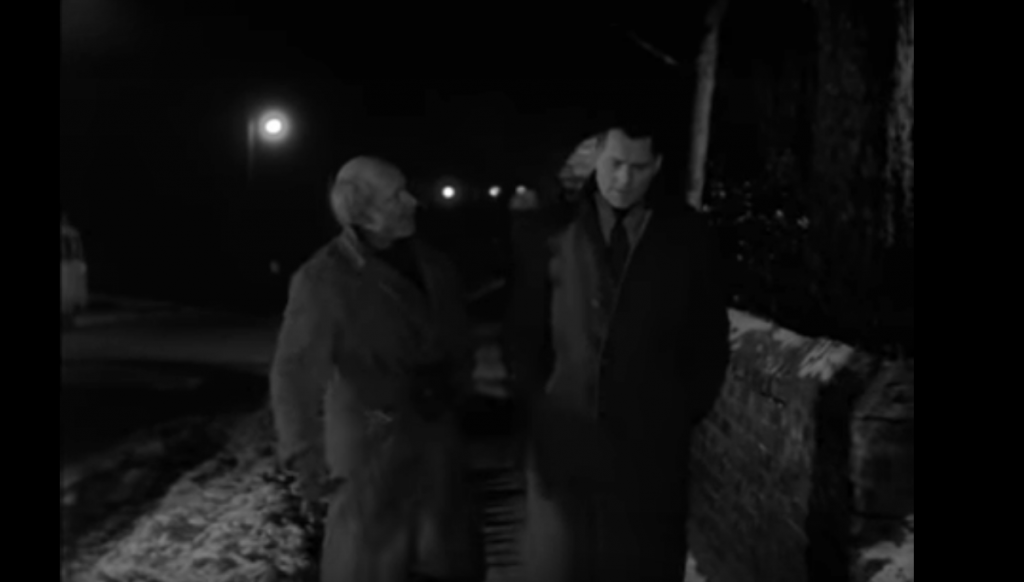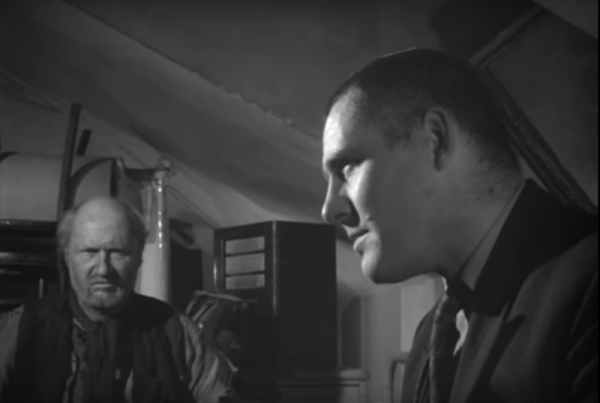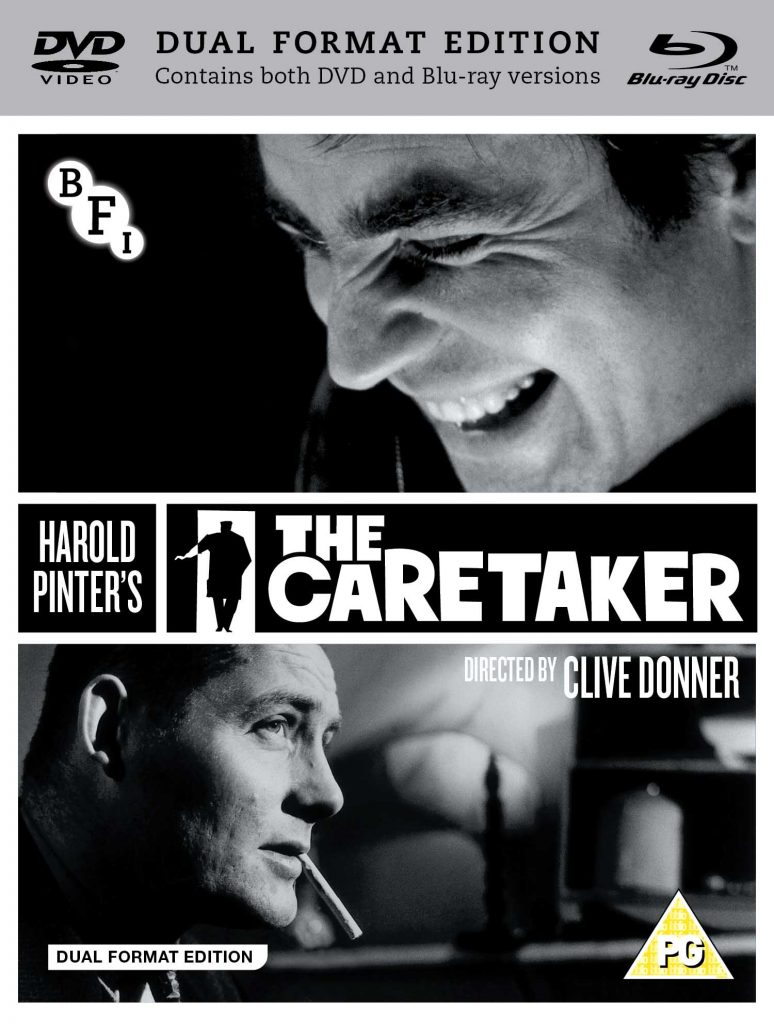by Mark Taylor-Batty
In the late 1950s, Harold Pinter struggled to establish himself as a playwright after the commercial flop of the first West End production of one of his plays, The Birthday Party. His talent found refuge in writing for radio and television until the incredible success, in 1960, of The Caretaker at the Arts Theatre, starring Donald Pleasance, Alan Bates and Donald Woodthorpe. The commercial and critical success of that play was key to his becoming a household name in the 1960s, and represents to this day an important cornerstone of his oeuvre. The original West End production soon transferred to Broadway, with Robert Shaw taking on Woodthorpe’s role. A project to make a film of the play was soon conceived, involving Bates, Pleasance and Shaw reprising their roles for the screen, and a modest budget was put together with support from Richard Burton, Noel Coward, Peter Hall, Peter Sellers and Elizabeth Taylor, among others.
This new DVD release is a restoration of the original film and an update of the BFI’s 2002 edition of the film, containing the commentaries of Alan Bates, director Clive Donner and producer Michael Birkett (all three of whom are no longer alive) and represents a newly restored version from the original camera negative in both standard and High Definition, and on both DVD and Blu-Ray. The result is a lovely rendition for the digital age of this remarkable artefact from the early 1960s, a milestone in British cinema, capturing the precise cinematography of Nicolas Roeg.

Still from The Caretaker
The play from which the screenplay evolved had its origins in 373 Chiswick High Road, West London, where Pinter lived with his first wife and new-born son in the late 1950s. As part of his arrangement with the landlord, Pinter stoked the boiler in the basement and did other small jobs. The owner was in the building trade, and his brother Austin lived in another flat in the house, and acted as caretaker for the place. Austin had suffered ECT treatment in a mental hospital and at one point he invited a homeless person to stay with him for three or four weeks. Passing the open door of their apartment one day, Pinter caught a glimpse of the two men in silent poses, and the arrangement struck him as inspiration for his new play.
Set in a single room of a house that is being done up, packed with junk and various DIY paraphernalia, and with a bucket suspended from the ceiling to catch drips from a leaking roof, the work is centred around the relationship between two brothers, Mick and Aston (played by Bates and Shaw), and a homeless man that Aston invites into the house, Davies (Pleasance). The guest soon begins to abuse the generosity that is extended toward him, and, rather than simply eject him and interfere in his brother’s decisions, Mick has to bring about a separation between Aston and Davies to manufacture the new lodger’s demise. The first all-male script written by Pinter, the work considers the bonds between people, and the various forms of betrayal of trust and expectation that arise between them. It perhaps also captures some of that toxic masculinity that comes fully to the fore a few years later in his The Homecoming, another highly successful play that was made into a film: the men express emotional contact or care through action and gesture, rather than directly and unambiguously in dialogue. Mick looks after his brother Aston by giving him shelter and entertaining his illusion that he might assist in the project of fixing up the dilapidated building into a group of flats, and a home for the two of them. When real emotion is expressed, notably in the speech in which Aston recalls his electroshock treatment, it is treated as suspect, and the scene is key to Davies’s rejection of the man who has offered him a roof over his head.

still from Caretaker
Davies is clearly an opportunist, unwilling to accept responsibility for his own failings, and unable to read kindness as anything but a weakness to be exploited. Aston, whose brother has nominally put in charge of the repairs and work on the house, but who in reality fails even to change the plug on a toaster over the course of the film, is clearly being managed and cared for by Mick. He protects his brother from Davies by appealing to the tramp's opportunism, causing him to reject Aston and put his hopes in some employment and authority that Mick might generate for him, only to be left isolated and with no choice but to leave the shelter and hospitality he had so ungraciously and ungratefully abused. The work is concerned perhaps with the forms of care-taking that people adopt over one another, and the vulnerability of the bonds that compassion might build, but which are effaced by distrust and self-serving.
The 1963 film captures those original well-rehearsed performances by Bates, Pleasance and Shaw and contains them within the tight, claustrophobic location set, a house at 30 Downs Road, Hackney, around the corner from Pinter’s childhood home. External scenes were shot around Hackney, and filming took place in the bitter winter of 1962, with snow and dirty slush on the ground and streets. Transfer from the stage to screen can often capture seemingly overblown acting and facial gestures, necessary to convey the play across the threshold of the fourth wall to an audience, but surplus to requirements when you have a camera closing in on your expressions. The acting here avoids this pitfall, a testament not only to the skill of the interpreters, but to the decision to film entirely on location in a cramped attic, pulling those well-oiled and familiar performances to operate within the dimensions of a real space. Donner had them rehearse for a week, and finally rehearse the scenes in order, in costume and in location from beginning to end. Much of the filming, too, was done in script order. This all made for a gritty naturalness that was visually in tune with the social realism of much British cinema of the time, without participating in any ambition to comment on socio-economic realities beyond the references to social care, racism and upwardly mobile ambition that figure as more indicative of character than of political message.

The Caretaker cover
The screenplay does not diverge from the original play significantly, though an opening scene set in the café where Davies loses his job was written and rejected. The external shots allowed for some extra material to be written in that contributed to the work’s themes. A wonderful example is a scene set in the garden, which Davies looks down upon from the window of the attic room, and in which Mick and Aston silently contemplate a pond in the garden. The seeming inability of the two brothers to share any conversation, juxtaposed with their closeness, against the prying eyes of the outsider Davies, offers a vignette of the relationship of all men positioned at the heart of the play.
Another scene sees Mick pull up in his van beside Davies in the street and offer to take him down to Sidcup. As the character has consistently used the excuse that he needs to get to Sidcup to collect his papers, the scene exploits that fantasy, and is ultimately a ploy to tease Davies, as Mick simply drives round in a a circle - the camera following in one shot - and kicks Davies out of the car explaining the problems he would have in getting south of the river.
The film is introduced by critic and Pinter biographer Michael Billington, and in the special features on the DVD there is also a documentary by him considering the evolution of the script, the development of the work for the screen, and the reviews the film received. Other features include a 1973 interview with the film’s director Clive Donner, a fascinating stills gallery, and a small treat in the form of a 1969 cartoon version of the Pinter sketch Last to Go, voiced by Donald Pleasance and Harold Pinter himself. It’s a wonderful package, and a neatly and thoughtfully curated collection of material to inform and supplement the fully restored experience of the original film.
About the Author:
Mark Taylor-Batty is a senior lecturer at the University of Leeds, and author of The Theatre of Harold Pinter, published by Bloomsbury. He assisted Pinter in the construction of his personal website haroldpinter.org and is currently running an AHRC-funded project to survey the history of productions of Pinter’s plays in the UK: pinterlegacies.com
The Caretaker, dual format edition, avaialble from the BFI shop